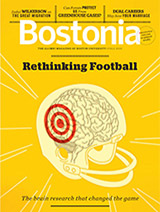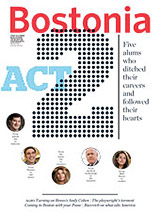When the Frederick S. Pardee School of Global Studies officially opened at the start of this semester, Adil Najam, the school’s inaugural dean, found himself pondering a particularly gratifying paradox. “This is a newest school on campus,” said Najam, “and yet we are custodians of some of BU’s oldest and most cherished traditions.”
One of those traditions, says Najam, a College of Arts & Sciences professor of international relations and of earth and environment, is the University’s long history of global studies, as well as its global character. “At the same time,” he says, “this is a school that is very conscious of the fact that it was put together in the 21st century. And it very consciously wants to reflect the reality of the 21st century globe.” That paradox, he says, is one of the things that sets the Pardee School apart from many other schools.
“If you look around at other schools of international affairs, most of them were the result of the grand challenges of their times,” he says. “And the grand challenges of their times were the great wars and the beginning of the world coming together. Today, the grand challenge of our times is that the world has shrunk and we don’t know how to manage it when the world is this connected. We don’t know how to manage a world where things are tweeted for three days before CNN actually picks it up. How do you manage a world when it is not only news and articles that tell what is happening, people are tweeting, and global finance is about bitcoin?”
The Pardee School, which moved into its offices at 121 Bay State Road in September, was born last year when Frederick S. Pardee (SMG’54, GSM’54, Hon.’06) donated $25 million to endow it. The school, which is housed in the College of Arts & Sciences, is an aggregation of expertise, bringing together faculty from across the University to support interdisciplinary research aimed at the great challenge of advancing global human progress and educating the next generation of leaders who will address these issues. The Pardee School’s stated mission is nothing less than improving the human condition around the globe.
The new school offers students five majors: international relations with a variety of emphases, Asian studies, European studies, Latin American studies, and Middle East and North Africa Studies. Pardee minors are also available to all BU undergraduates in these areas and in African languages and literatures, African studies, Muslim societies, and Muslim cultures.
Structurally, the Pardee School, which offers 16 degrees, has 2 divisions: one for regional studies and another for international studies. The former includes the college’s areas studies programs—the Center for the Study of Asia, the Center for the Study of Europe, the Latin American Studies Program, the African Studies Center, the Institute for the Study of Muslim Societies & Civilizations, and the new Middle East and North Africa Studies Program. Many of the school’s 50 professors have joint appointments, some tenured, some not, in the Pardee School and other CAS departments. In all, about 180 professors are affiliated with the school.
Betty Anderson, a CAS associate professor of history and director of the Institute for the Study of Muslim Societies & Civilizations, says its creation has created a fertile space for new ideas, courses, and seminars.
“We are already having good conversations about working together,” says Anderson. “Too often, at schools as large as BU, faculty end up working only in their own centers, so it’s great to have someplace where the directors of all the centers can come together. Soon you start to have shared programs, you bring in speakers together, you have conferences, and all of that brings in more students.”
Erik Goldstein, a CAS professor of international relations and of history, sees the school as something that BU was long destined to establish. “In many ways,” says Goldstein, a former chair of the international relations department, “BU has been preparing for something along these lines for many years. The University has a long history of international and global dimension. In fact, ever since I came to BU 16 years ago, this is the moment I’ve been working towards. It will crystallize all of the cooperative potential that I had wanted to see when I accepted the post.”
Goldstein practices what he preaches and regularly advises diplomats in Europe and beyond, as do many other Pardee professors. Vivien Schmidt, Jean Monnet Professor of European Integration, a CAS professor of international relations and of political science, and the director of the Center for the Study of Europe, works with the European Union on issues related to policy and governance. Kevin Gallagher, a CAS associate professor of international relations, advises policy institutes around the world on development finance, focusing on China–Latin America economic relations. Henrik Selin, a CAS associate professor of international relations, is an expert on issues ranging from how best to conduct global management of hazardous wastes to global climate change. And Najam is currently serving on the UN Secretary General’s Committee for Development Policy and on the boards of the World Wide Fund for Nature and the Asia Foundation.
Najam considers the real-world activities of Pardee professors to be a model for his students, who he says have a wide range of career interests in all parts of the world.
“The good news,” he says, “is that we already have the students we want. We have about 800 undergraduate students and more than 100 graduate students. They are in various degree programs in CAS. Their interests vary, but one thing we do know is that 75 percent of our students will study abroad. We have students who have worked in refugee camps in Jordan.”
Maria Paez (CAS’16) has been studying international relations for two years. She says the creation of the Pardee School has expanded opportunities for students. “It now encompasses new perspectives,” says Paez, who hopes to work with sustainable development in Latin America. “The school, with more resources, will allow students to better shape their career paths. Also, being part of a school, rather than a department, gives students a greater sense of community and pride.”
Amir Feinberg (CAS’16), who entered BU on a premed track and switched his major to international relations, says the cohesiveness of the Pardee School opens up to him more courses that he might find interesting. “I’m so excited,” says Feinberg. “I’m trying to take advantage of every opportunity.”
Feinberg’s excitement is exactly what Najam was hoping to see. He points out that undergraduates’ being the majority of the Pardee School’s students is another factor that sets it apart from other schools of international relations, many of which enroll only graduate students.
“Here is what I want it to mean to be a Pardee graduate,” says Najam: “I want it to mean that graduates are deeply committed global citizens and that they have a sense of duty to their community and to their country. I also want them to have a real global vision, a global sense of belonging. How does that come about? That comes from what we teach, what they learn. I think we will change the world, because if we can influence our students, our students will change the world.”













































Related Stories
Adil Najam Named Dean of Pardee School of Global Studies
New leader is global policy expert
Frederick S. Pardee Pledges Another $25 Million to Pardee School of Global Studies
Alum’s gift could pave way for stand-alone building for school he endowed
Frederick S. Pardee Gives
$25 Million to Endow
School of Global Studies
School’s mission: “advancing human progress”
Post Your Comment